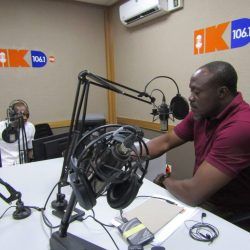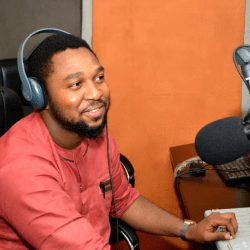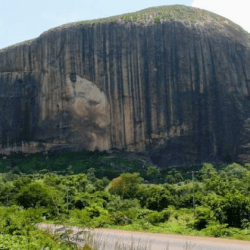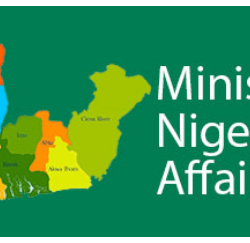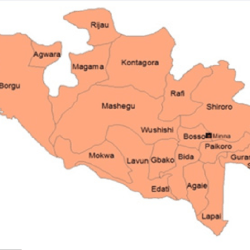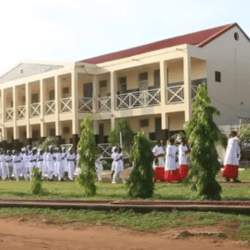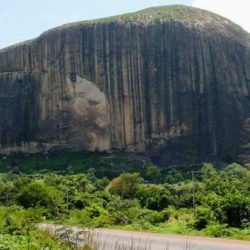Radio Niger of Niger State, Nigeria
The Broadcasting Corporation of Niger State (BCNS) was established by Niger State Government Edict No.2 of 1st April 1979. However, the BCNS started actual operation in 1978.

Prior to this date, the station that was to form the nucleus of the BCNS was a Nigeria Broadcasting Corporation, NBC repeater station, headed by a Controller at that time, the late Alhaji Ahmed Lukeman.
Edict NO.2 of April 1979 which established the BCNS charged it with responsibility for Radio Broadcasting Services on behalf of the government for so much of the state as may, from time to time, be reasonably practicable”.
The organization took off with five departments Viz: Administration, Engineering, News and Current Affairs, Programmes and Accounts with a General Manager as Head of the corporation.
The first General Manager under this dispensation was Alhaji Ibrahim Ahmed Bawa Kontagora (1979-1984). Within this period, the foundations for the BCNS permanent structures were laid, including its Head Office Complex along Broadcasting Road, Minna.
In order to achieve wide coverage of the state, the BCNS undertook the establishment of booster stations at Bida and Kontagora.
All this period, it operated on 10KW Transmitter in Minna, the state capital.
In 1984, it took over the FRCN station established in 1983 by the then civilian government of Alhaji Shehu Shagari. This greatly boosted its transmission capacity as the FRCN Transmitters were 50KW.
Between 1986-1992 Booster Stations were added at Suleja and Mokwa. In 1993, the head office studio complex, initiated in 1979 was finally commissioned by former President, General Ibrahim Babangida. At the same ceremony, General Ibrahim Babangida laid the foundation for the Administrative Block of the Head Office Complex.
Work on this started immediately but was later halted. It was however, completed and commissioned in 1997 by the State Military Administrator, Commissioner of Police, Simeon Oduoye.
In 1994, the BCNS added an FM station – “Crystal Radio” to its transmission network. It operates on 30KW Transmitter and is highly popular and acknowledge as the best north of the Niger.
Within Niger State, BCN has listenership of an estimated one point three million (1.3million) households out of an estimated state population of two point five million (2.5million) people.
In the listening audience, over 78.4|% of head of households are ages 30 and over about 45% are above post primary education, 65% are gainfully employed.
On a wider scale, the services of the BCNS are received in Sokoto, Kebbi, Zamfara, Kano, Kaduna, Katsina, Jigawa, Kwara, Kogi, Delta, Edo, Nassarawa, Anambra, Oyo, parts of Enugu, Plateau, Benue, Federal Capital Territory (Abuja) and Northern Benin Republic on AM and FM.
Based on the reach of its signals, the BCNS received patronage from these areas.
The diversity and versatility of her programme content and packaging have been found to hold appeal for a variety of social classes within these areas.
The Corporation has received national and internal recognition of its services. Apart form English, BCNS transmits in eleven languages and is involved in programme exchange with some sister organizations in the country.
In its thirty-two (32) years history BCNS has at various times been headed by Alhaji Ahmed Lukeman (deceased), Alhaji Ibrahim Ahmed Bawa Kontagora a veteran broadcaster, Deputy Commissioner of Police, late Sani Yaroson, Mr. Bonaventure Hycintho, Alhaji Aliyu Goro (deceased), Alhaji Iliyasu Dhacko, Alhaji Ndagana Abdullahi Musa Kinbokun, Alhaji Abdullahi Abdullahi Abdu Paiko and Mallam Isah Kawu.
In 2000 the Niger State House of Assembly passed into law a bill establishing the Niger State Media Corporation during Engineer Abdulkadir Abdullahi Kure’s administration with Ibrahim Abdulmalik becoming the first Executive Director Radio.
The present Executive Director Radio is Alhaji Yusuf Abarah Idris.
Departments in Radio Niger include:
- Administrative
- Accounts
- Engineering
- Programmes
- News and Current Affairs
- Audit and Commercials.
Reference: nigerstate.gov.ng/radio-niger.html
Niger
Niger is a State located in central Nigeria and its capital city is Minna.
Other top cities in Niger State include Bida, Suleja and Kontagora.
The State has an expansive land area and it’s close to the nation’s capital, Abuja.

Creation: It was created out of the defunct North Western state on 3rd February, 1976.
Location: Situated in the North central geo-political zone.
Administrative areas: The State comprises 25 Local Government Areas grouped into 3 administrative zones: A, B, C with each zone having 8, 9 and 8 Local Government Areas (LGAs) respectively.
List of Local Government Areas
Niger State has 25 Local Government Areas, namely:
- Agaie
- Agwara
- Bida
- Borgu
- Bosso
- Chanchaga
- Edati
- Gbako
- Gurara
- Katcha
- Kontagora
- Lapai
- Lavun
- Magama
- Mariga
- Mashegu
- Mokwa
- Munya
- Paikoro
- Rafi
- Rijau
- Shiroro
- Suleja
- Tafa
- Wushishi
Local Government Areas and their headquarters
The Local Government Areas in Niger State and their headquarters are:
| SN | LGA | HEADQUARTERS |
| 01 | Agaie | Agaie |
| 02 | Agwara | Agwara |
| 03 | Bida | Bida |
| 04 | Borgu | New Bussa |
| 05 | Bosso | Maikunkele |
| 06 | Edati | Enagi |
| 07 | Gurara | Gawu Babangida |
| 08 | Gbako | Lemu |
| 09 | Katcha | Katcha |
| 10 | Kontagora | Kontagora |
| 11 | Lapai | Lapai |
| 12 | Lavun | Kutigi |
| 13 | Mariga | Bangi |
| 14 | Mokwa | Mokwa |
| 15 | Magama | Nasko |
| 16 | Mashegu | Mashegu |
| 17 | Munya | Sarkin Pawa |
| 18 | Paikoro | Paiko |
| 19 | Rafi | Kagara |
| 20 | Rijau | Rijau |
| 21 | Shiroro | Kuta |
| 22 | Suleja | Suleja |
| 23 | Tafa | Sabon-Wuse |
| 24 | Wushishi | Wushishi |
| 25 | Minna | Minna |
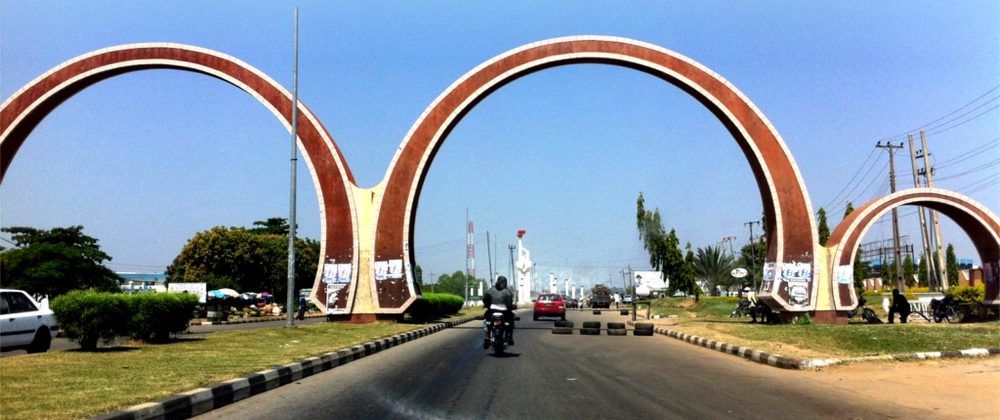
Boundaries: Niger State shares its borders with republic of Benin (West), Zamfara State (North), Kebbi (North-West), Kogi (South), Kwara (South West), Kaduna (North-East) and the FCT (South-East).
Land area, the largest among Nigerian states: Niger State is one of the largest states in Nigeria covering about 86,000km2 (or about 8.6million hectares) representing about 9.3% of the total land area of the country.
Major rivers: Niger State’s major rivers are: Niger, Kaduna, Gbako, Eko, Gurara, Ebba, Ega, Mariga and their tributaries.

Fishes: The common fishes found in these rivers are: Nile Perch (Lates) Trunck fish, Cat fish, Osteoglosid, Tilapia, Synodontis, Tiger fish, Moon fish, Mormyrid and Electric fish. By the 2006 census, the State’s population is 3,950,249 comprising 2,032,725 males and 1,917,524 females.

Ethnic groups: The easily identifiable major ethnic groups are Nupes, Hausa, Gbagyi, Kadara, Koro, Bassa, Kamuku, Ingwai, Fangu, Kambari, Dukkawa, Fulani, Abewa, Bisan, Gungawa, Bauchi, Bariba, Urah, Boko, Bokobaro, Bauchnu, Achifawa, Dakarkari, Kakanda, Ganagana, and Dibo and numerous non native tribes.
Economic activities: The major economic activity is agriculture: farming, fishing, and cattle rearing.
The other economic activities (though limited in scale) include banking, trading, transportation, local arts and crafts with Bida, the heart land of the Nupes, famous for its brass work. These activities constitute the means of livelihood of the people of Niger State in addition to public service.
Reference: nigerstate.gov.ng/about-niger
